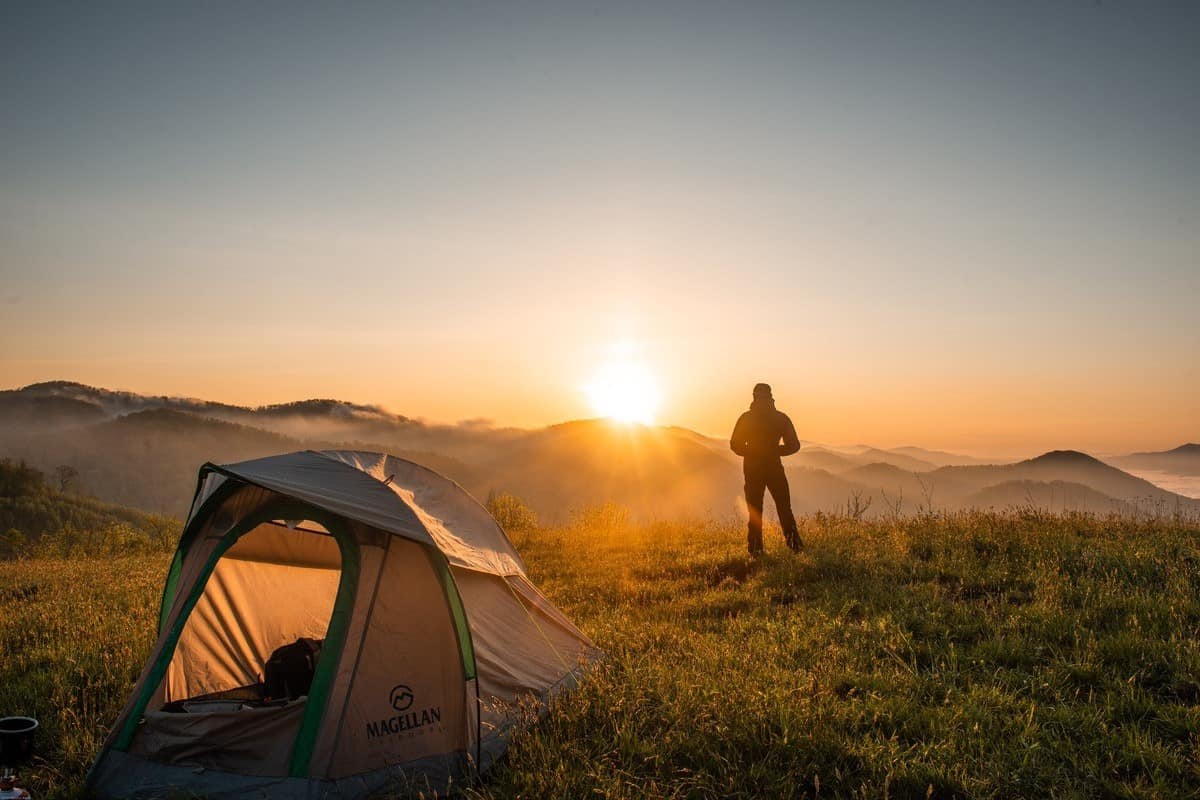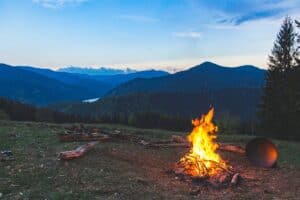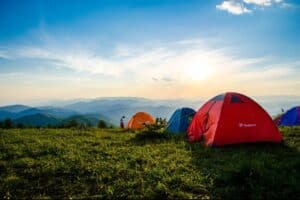Are you a beginner interested in trying out camping but not sure where to start? Need some camping tips? Camping can be an exciting and fulfilling experience, but it can also be overwhelming, especially if you’re new to it. That’s why we’ve put together this comprehensive guide to help you navigate the world of camping for beginners. From choosing the right location to packing the essential gear and engaging in fun activities, we’ve got you covered. So sit back, relax, and get ready to embark on an unforgettable adventure in the great outdoors.
Planning Your Camping Trip
- Choosing the Right Camping Location
Choosing the right camping location can make or break your camping trip. Here are some factors to consider when choosing a camping location:
- Accessibility: Consider how far you are willing to travel and how remote you want to be. Some people prefer camping in a remote location, while others prefer to be close to amenities.
- Terrain: Consider the type of terrain you want to camp on. Do you prefer a mountainous area or a flat surface? Do you want to camp near a river or lake?
- Weather: Consider the weather conditions in the area you are planning to camp. Will it be too hot or too cold? Will it be rainy or windy?
- Facilities: Consider the facilities available in the camping area. Are there restrooms, showers, or picnic tables? Are there any restrictions on campfires or pets?
- Deciding on the Duration of Your Trip
Deciding on the duration of your camping trip is important for planning your itinerary and packing appropriately. Consider the following factors when deciding how long to camp:
- Time off: Consider how much time you can take off work or school.
- Experience: If you are new to camping, consider starting with a shorter trip to get a feel for it.
- Destination: Consider how far you are traveling and how much time you want to spend at your destination.
- Selecting the Right Time of Year to Camp
Selecting the right time of year to camp is important for ensuring a comfortable and enjoyable experience. Consider the following factors when selecting the right time of year to camp:
- Weather: Consider the weather conditions during the time of year you plan to camp. Is it too hot or too cold? Is there a risk of thunderstorms or hurricanes?
- Crowds: Consider the peak camping season and how crowded the camping areas are likely to be.
- Wildlife: Consider the time of year when wildlife is most active in the area you plan to camp.
- Making a Camping Checklist
Making a camping checklist is essential for ensuring you have everything you need for a successful camping trip. Here are some items to include on your camping checklist:
- Shelter: Tent, tarp, or hammock.
- Sleeping gear: Sleeping bag, sleeping pad, or air mattress.
- Cooking gear: Camp stove, cookware, utensils, and fuel.
- Food and water: Non-perishable food items and plenty of water.
- Clothing: Appropriate clothing for the weather and activities.
- First aid kit: Bandages, antiseptic, pain relievers, and any prescription medications.
- Lighting: Flashlights, lanterns, or headlamps with extra batteries.
- Navigation: Maps, compass, GPS, and a whistle.
- Personal items: Toiletries, sunscreen, insect repellent, and any other personal items you may need.
By following these tips for choosing the right camping location, deciding on the duration of your trip, selecting the right time of year to camp, and making a camping checklist, you will be well on your way to having a safe and enjoyable camping experience. Remember to plan ahead, pack appropriately, and have fun!
Essential Gear for Camping
When it comes to camping, having the right gear is crucial to ensure a safe and enjoyable experience. Here are some essential pieces of gear to consider for your next camping trip:
- Tent: A tent is the most basic form of shelter for camping. Choose a tent that is durable, weather-resistant, and the right size for your group.
- Sleeping bag: A sleeping bag is an essential piece of gear for camping. Choose a sleeping bag that is appropriate for the expected temperature range.
- Sleeping pad: A sleeping pad is used to insulate and cushion your sleeping bag. Choose a sleeping pad that is comfortable and provides enough insulation for the expected temperature range.
- Camp stove: A camp stove is used for cooking meals while camping. Choose a camp stove that is portable, durable, and fuel-efficient.
- Cookware: Cookware is necessary for preparing meals while camping. Choose cookware that is lightweight, durable, and easy to clean.
- Headlamp or flashlight: A headlamp or flashlight is necessary for navigating in the dark. Choose a headlamp or flashlight that is bright, durable, and has a long battery life.
- First aid kit: A first aid kit is essential for addressing minor injuries and medical emergencies. Choose a first aid kit that is well-stocked and includes items such as bandages, antiseptic, and pain relievers.
- Navigation tools: Navigation tools such as maps, compasses, and GPS devices are essential for navigating while camping. Choose navigation tools that are accurate and reliable.
- Water filtration system: A water filtration system is necessary for ensuring access to clean water while camping. Choose a water filtration system that is portable and effective at removing bacteria, viruses, and other contaminants.
- Backpack: A backpack is necessary for carrying all your gear while camping. Choose a backpack that is comfortable, durable, and the right size for your needs.
By bringing along these essential pieces of gear, you’ll be well-prepared for a safe and enjoyable camping experience. Don’t forget to also bring along any personal items you may need, such as toiletries, sunscreen, insect repellent, and extra clothing. With the right gear and preparation, you’ll be able to enjoy all the wonders of the great outdoors.
Setting Up Camp
Setting up camp is an important part of any camping trip, and doing it right can make all the difference in your overall experience. Here are some tips on how to set up camp effectively:
- Finding a suitable spot to pitch your tent
The first step in setting up camp is finding a suitable spot to pitch your tent. Look for an area that is flat, dry, and well-drained. Avoid setting up camp in low-lying areas that are prone to flooding or near areas that are at risk of falling debris, such as dead trees or unstable rock formations. Also, be sure to check if there are any camping restrictions or designated campsites in the area.
- Setting up your tent and other gear
Once you’ve found a suitable spot, it’s time to set up your tent and other gear. Begin by laying out your groundsheet and assembling your tent. Make sure to follow the manufacturer’s instructions carefully to ensure that your tent is properly set up and secured.
Next, set up your sleeping area by inflating your sleeping pad and unrolling your sleeping bag. Organize your other gear, such as your camp stove and cookware, in a designated area to make cooking and meal prep easier.
- Building a fire
Building a fire is an important part of the camping experience, but it must be done safely and responsibly. Before building a fire, check to see if fires are allowed in the area and if any fire restrictions are in place. Once you’ve determined that it’s safe to build a fire, choose a level area away from trees, brush, or any other flammable materials.
Gather firewood, kindling, and tinder, and arrange them in a teepee or log cabin structure. Use a lighter or matches to ignite the kindling and add more firewood as needed. Keep a bucket of water or shovel nearby to extinguish the fire when you’re finished.
By following these tips, you’ll be able to set up camp effectively and enjoy a safe and enjoyable camping experience. Remember to leave no trace and pack out all your trash and waste to help preserve the natural beauty of the outdoors for generations to come.
Staying safe and healthy:
Staying safe and healthy is crucial when camping, as being out in nature can present its own set of challenges. Here are some tips to help you stay safe and healthy while camping:
- Bring appropriate clothing: Dress in layers and bring rain gear if necessary. It’s also important to wear sturdy, comfortable shoes or hiking boots to protect your feet while exploring the outdoors.
- Stay hydrated: Bring plenty of water and drink regularly to prevent dehydration. Avoid drinking untreated water from rivers or streams, as it may contain harmful bacteria.
- Use insect repellent: Use insect repellent to protect yourself from ticks, mosquitoes, and other insects that can carry diseases. Wear long sleeves and pants in areas where ticks are prevalent, and check yourself for ticks regularly.
- Follow fire safety precautions: Build fires only in designated areas, keep a bucket of water or shovel nearby, and never leave a fire unattended. Before going to sleep or leaving the campsite, make sure the fire is completely extinguished.
- Be aware of wildlife: Respect the natural environment and keep a safe distance from wildlife. Store your food and trash properly to avoid attracting bears or other animals to your campsite.
- Bring a first aid kit: A well-stocked first aid kit is essential for any camping trip. Be sure to include items such as bandages, antiseptic, tweezers, and medication for any pre-existing conditions.
- Practice good hygiene: Wash your hands regularly, especially before handling food, to prevent the spread of bacteria. Use biodegradable soap and dispose of wastewater properly.
By following these tips, you can help ensure a safe and healthy camping experience. Always be aware of your surroundings and follow any rules or regulations in the area to help protect both yourself and the environment.
Fun Activities to Do While Camping
Camping is not just about sleeping in a tent and staring at the stars. There are plenty of fun activities to do while camping that will keep you active, entertained, and engaged with nature. Here are some ideas:
- Hiking and exploring nature: One of the best things about camping is being surrounded by natural beauty. Take advantage of the opportunity to go on hikes and explore the surrounding area. Check out nearby trails, lakes, and rivers, and don’t forget to bring your camera to capture the scenery.
- Fishing and other outdoor sports: If you’re an angler, bring your fishing gear and try your luck at catching some fish. Other outdoor sports like kayaking, canoeing, or rock climbing are also great activities to consider. Just make sure you have the necessary equipment and safety gear.
- Playing games and other group activities: Camping is an excellent opportunity to bond with family and friends. Bring some games like frisbee, cards, or board games that are easy to pack and play. Group activities like campfire storytelling, singing, or stargazing are also great ways to spend quality time together.
- Wildlife watching: Camping can offer a unique opportunity to observe wildlife in their natural habitat. Bring binoculars and a camera to spot animals such as birds, deer, squirrels, and more. Just remember to observe from a safe distance and never feed or disturb wildlife.
- Nighttime activities: The fun doesn’t have to stop when the sun goes down. Bring a flashlight or headlamp and explore the campsite at night. You can also tell ghost stories, make s’mores, or stargaze on clear nights.
Remember, camping is all about enjoying the great outdoors and spending time with loved ones. Choose activities that you’ll all enjoy and create unforgettable memories together.
Camping Tips (Conclusion):
Camping can be a fun and exciting adventure for beginners. To ensure a successful trip, it’s important to choose the right location, pack the necessary gear, and follow safety guidelines. Here’s a quick recap of the tips and tricks we’ve covered in this article:
- Choose a suitable camping location based on your preferences, activities, and level of experience.
- Pack the essential gear, including a tent, sleeping bag, cooking supplies, and personal items.
- Prepare a camping checklist to ensure you don’t forget anything important.
- Set up camp in a safe and comfortable spot, and build a fire if allowed and necessary.
- Follow safety guidelines, including campfire safety, wildlife safety, and hygiene practices.
- Engage in fun activities such as hiking, fishing, playing games, wildlife watching, and stargazing.
As a beginner, camping can seem daunting, but it doesn’t have to be. With the right mindset, preparation, and attitude, anyone can have a successful camping trip. Remember to embrace the experience, appreciate the beauty of nature, and make lasting memories with loved ones.
In conclusion, if you’re a beginner, don’t be afraid to give camping a try. It’s a great way to unplug from technology, reconnect with nature, and recharge your mind and body. With some planning and preparation, your first camping trip can be a rewarding and unforgettable experience. So grab your gear, pack your bags, and hit the trails – adventure awaits!




great article
Outstanding feature